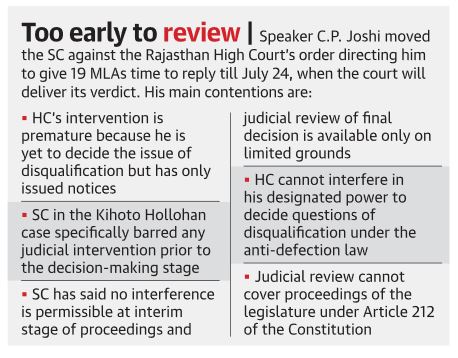From UPSC perspective, the following things are important :
Prelims level: Tenth Schedule
Mains level: Issues over Judicial discretion in Anti-defection

A Supreme Court Bench is scheduled to hear an appeal filed by the Rajasthan Assembly Speaker’s office challenging the State High Court order to defer anti-defection proceedings against former Deputy CM.
Try these questions:
Q. “The anti-defection law works best as an insurance against violation of the people’s mandate for a party, but it cannot be made a tool to stifle all dissent.” Discuss.
—–
Q.Which one of the following Schedules of the Constitution of India contains provisions regarding anti-defection? (CSP 2014)
(a) Second Schedule
(b) Fifth Schedule
(c) Eighth Schedule
(d) Tenth Schedule
What is the issue?
- The petition said the HC has crossed its jurisdiction by asking the Speaker to put off his decision on the disqualification notices issued to dissident MLAs.
- The HC order was an affront to the powers of the Speaker.
- The High Court’s interim order granting extended time to rebel MLAs to file their replies to anti-defection notices amounted to a violation of Article 212 (courts not to inquire into the proceedings of the legislature).
Backed by Tenth Schedule
- The petition said that judicial review of ongoing anti-defection proceedings was limited.
- Notice is much prior to any final determination or decision on disqualification.
- The proceedings, including the notice, are in the realm of the legislative proceedings under Paragraph 6(2) of the Tenth Schedule, the Speaker’s office argued.
Citing the Kihoto Hollohan case
- The petition referred to the Constitution Bench judgment of the top court in the Kihoto Hollohan case in 1992 in this context.
- Judicial review cannot be available at a stage prior to the making of a decision by the Speaker/Chairman and a prior action would not be permissible.
- Nor would interference be permissible at an interlocutory stage of the proceedings, the verdict says.
Must read:
What does the dissident MLAs have to say?
- The dissident MLAs had challenged the constitutionality of Paragraph 2(1)(a) of the Tenth Schedule which makes “voluntarily giving up membership of a political party” liable for disqualification.
- The MLAs had argued that the provision infringed their right to dissent.
- But the Speaker’s office countered that Paragraph 2 (1)(a) of the Tenth Schedule was the law of the land.
- A mere challenge to its constitutionality cannot efface it from the statute book.
Back2Basics
Get an IAS/IPS ranker as your 1: 1 personal mentor for UPSC 2024

